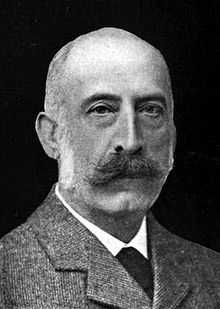Alexander Konstantinovich Benckendorff

Count Alexander Konstantinovich Benckendorff (Russian: Александр Константинович Бенкендорф) (1 August 1849 – 11 January 1917) was a Russian diplomat, who served as ambassador to Denmark and the United Kingdom.
Biography
He was born in 1846, the son of Count Constantin Alexander Constantinovich Benckendorff (22 October 1816 - Paris, 29 January 1858) and wife (Potsdam, 20 June 1848) Princess Louise Constantine Nathalie Johanne de Croy (Anholt, 2 November 1825 - Meran, 8 January 1890), grandson of General Count Konstantin von Benckendorff and grandnephew of General Count Alexander von Benckendorff, and was educated in France and Germany before entering the diplomatic service in 1869. He began as an attaché in Florence, and eventually served in Rome. He resigned in 1876 and lived nearly ten years on his estates, in St. Petersburg and abroad.
He married Countess Sophie Shouvaloff in 1879, and was survived by a son and a daughter. A younger son died in one of the first battles of World War I on the East Prussian front.
Returning to diplomacy in 1886, he became First Secretary at the Embassy in Vienna, and from 1897 to 1903 he was the Ambassador to Denmark. The Copenhagen post gave him a vantage point for watching the principal moving powers of European politics since the matrimonial alliances of the Danish royal family occasionally brought together in a friendly family circle the widow of Alexander III, Nicholas II and the Prince of Wales who was to become King Edward VII. In this way, Count Benckendorff received his initiation into the spirit of an Anglo-Russian rapprochement even before it actually resulted in an entente.
From 1903 until his death in 1917, he was the Ambassador to the Court of St. James's, the chief Russian diplomat in the United Kingdom. His major achievement was to organise the signing of the Anglo-Russian Entente in 1907, which solidified relations between the two nations and helped create the Triple Entente, the alignment which would later become the Allied Powers of the First World War.
In 1911 Benckendorff's daughter Nathalie married an Englishman, Jasper Nicholas Ridley, and later became the grandmother of the economist Adam Ridley.[1] His son Constantine married harpist Maria Korchinska.
Death
Alexander Konstantinovich Benckendorff died on 11 January 1917 and was buried inside the Westminster Cathedral, where he worshipped weekly. Benckendorff was also a convert to Roman Catholicism from Lutheranism.[2]
Honours and awards
- Order of St. Alexander Nevsky with diamonds "for ex-zealous service."
- Order of the White Eagle
- Order of St. Vladimir, 2nd and 3rd classes
- Order of St. Anna, 1st degree
- Order of St. Stanislaus, 1st degree
- Foreign awards
Notes
- ↑ Charles Mosley, ed., Burke's Peerage and Baronetage, 106th edition, vol. 1 (Crans, Switzerland: Burke's Peerage, 1999), p. 30
- ↑ Mark Langham (14 December 2007). "Solomon, I Have Surpassed Thee: The Russian in the Crypt". Westminstercathedral.blogspot.com.br. Retrieved February 2014.
References
- Obituary: p. 153-4, The Annual Register: a review of public events at home and abroad, for the year 1917. London: Longmans, Green and Co. 1918.
 Chisholm, Hugh, ed. (1922). "Benckendorff, Alexander, Count". Encyclopædia Britannica (12th ed.). London & New York.
Chisholm, Hugh, ed. (1922). "Benckendorff, Alexander, Count". Encyclopædia Britannica (12th ed.). London & New York.
Further reading
-
 This article incorporates text from a publication now in the public domain: Chisholm, Hugh, ed. (1911). "Alexander, Count Benckendorff". Encyclopædia Britannica (11th ed.). Cambridge University Press.
This article incorporates text from a publication now in the public domain: Chisholm, Hugh, ed. (1911). "Alexander, Count Benckendorff". Encyclopædia Britannica (11th ed.). Cambridge University Press. - Lundy, Darryl (20 June 2005). "Alexander Graf von Benckendorff". www.peerage.com. p. 9760 §97593.
- "DNB, Katalog der Deutschen Nationalbibliothek" (in German). Portal.dnb.de. Retrieved February 2014.
- http://www.idref.fr/081025262[]
|